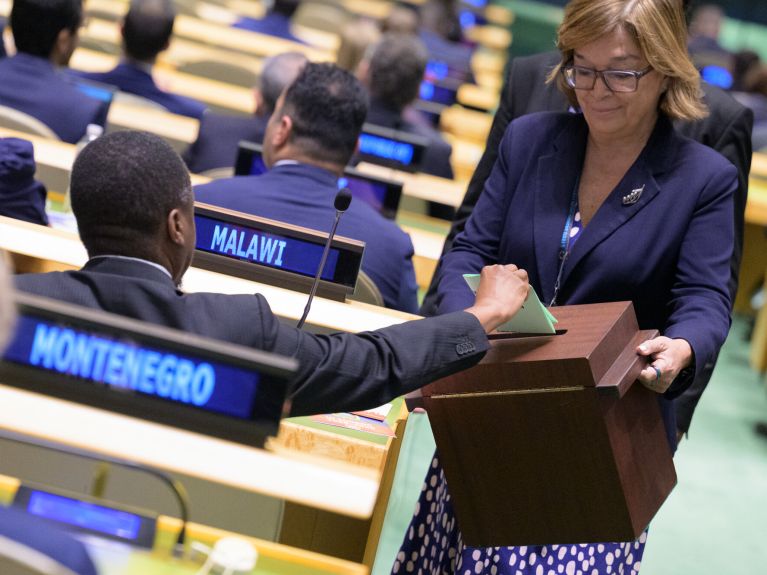Unilateral action out of the question
Peace through cooperation - Germany believes in international solutions. Why Germany’s Federal Government sees multilateralism as so important.

What does Germany’s Federal Government mean by multilateralism?
Germany sees this as referring to a global system that applies equally to all countries. The idea behind it is that only if everyone plays by the same rules can catastrophes such as the Second World War be prevented and new challenges overcome. This universal system is based on values that form the backbone of the international order. The United Nations (VN) serves as the guardian of these values and norms. Multilateralism involves states constantly and peacefully negotiating their interests and seeking the best solutions.
What role does the UN play in German foreign policy?
Germany’s membership of the UN, with its goal of maintaining a rule-based world order, shapes German foreign policy. Since joining the UN in 1973, Germany has been committed to upholding and further developing international law because the German government believes that global challenges can only be overcome by pursuing policies based on international law. This applies particularly to the current conflicts and crises, which encompass everything from the Middle East and Ukraine to climate change and biodiversity loss.
Why does Germany attach such importance to the UN?
Because that is where all the world’s states meet and can find solutions to common problems. Although the 15 members of the Security Council have special rights, and its five permanent members even have a veto right, every country has a vote in the general assembly. The UN thus creates a unique forum in which most of the world’s states are represented.
Does this emphasis on multilateralism also have anything to do with Germany’s history?
As the country that caused the Second World War, Germany has undertaken never again to operate unilaterally but always to act in agreement with other states in the foreign policy arena. This is what led to its resolute commitment to the European idea, and to its strong support for the UN. This is why for example the Federal Constitutional Court stipulated in a landmark ruling in 1994 that Germany should only be allowed to take part in missions abroad if it does so as part of collective security forces such as the UN or NATO.
We the peoples of the United Nations determined [...] to reaffirm faith in fundamental human rights, in the dignity and worth of the human person[.]
Why are human rights important in this context?
Human rights are an essential part of the UN’s framework of values and apply universally. They are non-negotiable and form the basis for all the UN’s other activities. Human rights already served as the basis for the goal and principles of the international order in the UN Charta from 1945. More details were laid down in the 30 articles of the Universal Declaration of Human Rights in 1948. Over the course of the decades, the contents of this Declaration were further elaborated and for example also form the basis for the International Criminal Court in The Hague, in whose foundation Germany played a key role.
What is Germany’s stance on the UN’s monopoly on violence?
According to the UN Charta, the monopoly on violence lies with the UN Security Council. It can decide on military measures in instances where peace is threatened or breached. Self-defence is allowed, though only until the Security Council takes action. Germany expressly supports this monopoly on violence and views it as the central basis of the international peace and security order. That said, in the view of the Federal Government the Security Council no longer reflects the world’s current balance of power and should therefore be reformed.
Which other multilateral organisations are relevant to Germany?
The Federal Government has embedded its foreign policy within a dense network of international organisations. These include first and foremost the European Union, which is far more than simply an economic community; it is also seen as a peace project and potential power centre in an increasingly multipolar world. Germany also belongs to NATO, a defence alliance that has become more relevant again of late. Furthermore, Germany is a member of various organisations, such as the OECD (Organisation for Economic Co-operation and Development), IRENA (Internationale Renewable Energy Agency) and IUCN (International Union for Conservation of Nature) In all, Germany belongs to 120 multilateral organisations.
At present, the multilateral system is facing challenges from different sides. What is Germany’s stance on this?
Germany is resolutely advocating for the rule of law rather than the rule of the strongest. The Federal Government sees the UN and the multilateral system as indispensable and will continue to support them. In this context, the coalition agreement of the government of the CDU/CSU and SPD states: “We want to strengthen multilateral structures. The United Nations forms the backbone of the rule-based international order.”


